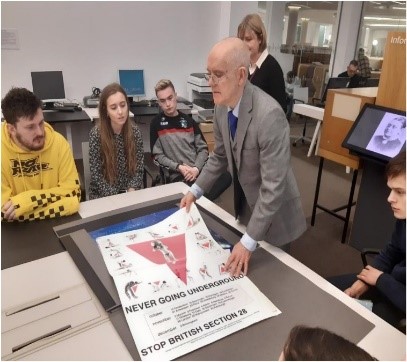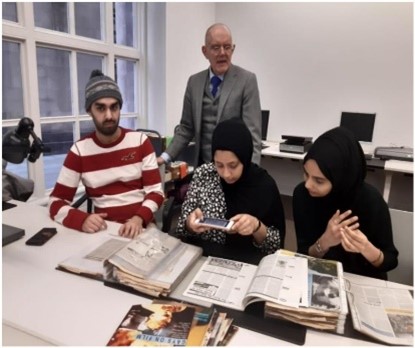LGBT+ History: Lessons for and from Trainee Teachers


Visits to countless schools over the past 3 years and scrutiny of countless curricula seem to confirm one thing to me: we don’t ‘do’ LGBT +History very well in schools. Of real concern is that for most students, ignorance is reinforced by the near absence of LGBT+ History from the National Curriculum (it is left to forward-thinking departments to improvise and ‘weave in’ LGBT+ histories into their curricula). There are, therefore, missed opportunities for a richly diverse reading of the past, of which LGBT+ History is an excellent and important example. Past attitudes to human sexuality and gender are an obvious starting point for departments wishing to make their teaching of History more inclusive. Most standard KS3 & KS4 school’s history textbook endorses this deafening silence with, at best, a handful of tokenistic insights attempting to cover, amongst others, Women’s History and Black History. The ignorance is further buttressed by the lack of training for our new teachers on how to make marginalised groups visible in the History curriculum.
However, most History teachers (certainly in my experience) agree that an inclusive reading of the past in not only academically sound (i.e. providing a more reliable history) but also provides students with excellent preparation for adult life, challenging harmful stereotyping
To improve this aspect of my own PGCE History programme, I contacted School Out about accessing expertise in this area. They connected me with Dr Jeff Evans, Research Fellow at Liverpool John Moores University and active campaigner for LGBT+ and human rights for the past 40 years. Jeff is one of the most prominent voices in the drive to bring an inclusive reading LGBT History to our classrooms and our collaboration thus far has been one of the highlights of the PGCE History programme.
Outline of the session and trainee learning
The aims of the session were threefold
- To provide the students with a definition for LGBT+ History and to consider what it might look like in a classroom context
- To explore how we can teach LGBT+ History and the potential obstacles
- To begin production of a series of lessons on LGBT+ History to share with other teachers and add to Schools OUT – The Classroom.
Jeff uses ‘The Chesters Model’ and his session began with a quotation that immediately stimulated a lively discussion and focused the PGCE students’ thinking. Jeff’s definition of inclusive history is as follows:
“Any and all readings of the past that lights-up those areas of our past (i.e. previously marginalised or excluded groups from ‘official’ history) are essential to gaining a more inclusive, accurate and thereby more relatable reading of our collective past.”
Once we had agreed a loose definition of LGBT + History and had a completed timeline activity exploring LGBT+ history from a chronological point of view discussions about the current state of LGBT+ History teaching in schools followed. LGBT+ histories are so often hard to locate because they are frequently entirely absent from school’s schemes of work the importance of oral testimony and archive material are clearly key here and this led us to field work location, the first one being the archives at Manchester’s Central Library. The PGC history trainees spent time exploring a range of primary source materials and considered how the source material could be placed at the center of the lessons they were to devise. Excerpts from the local and national press over the past 30 years helped to give the trainees an idea of the prevalence of homophobia in the mainstream media and also to chart the changing views over time.
Many of the trainees opted to use selected excerpts as the starting points of their lesson in looking at contemporary examples of opposition to and protest against, Section 28. Trainees were able to identify some excellent source material to bring into the classroom. Many of the students were unaware that such legislation existed so recently and were also surprised by the openly hostile nature of pieces in national broadsheets and tabloids towards the LGBT+ community. The value of working with source material like this soon became evident, the impact of touching and working with these artifacts stands in stark contrast to what many teachers are forced to do, mining source material from the internet. The impact and relevance of each piece of history was heightened.
I am now considering starting the PGC history course with an exploration of the many archives that Manchester has to offer. Every trainee left the Central Library with a selection of two to three sources that they would then form their lesson around. The next stop was the people’s History Museum for more exploration of the archives, the trainees unearthed a rich seam of material and lesson plans were further Refined and discussed we were treated to a tour of the archives on earth a couple of gems including the 1945 Labour Party manifesto and a variety of brilliant primary sources that helped illustrate hidden stories from within the LGBT+ community in Manchester. We’re looking forward to sharing our resources with the teaching community on the Schools OUT website when our materials go live.
This form of teaching is perfect for inclusive education enabling as it does, to give voice to the many communities that have been deliberately erased from our knowledge. ‘The Chesters Model’ dovetails beautifully with Schools OUT’s concept of “usualising“, clearly this form of teaching is a powerful way to decolonize the curriculum.
Schools OUT will be hosting an online session on ‘The Chesters Model’ with Dr Jeff Evans in January 2024.
